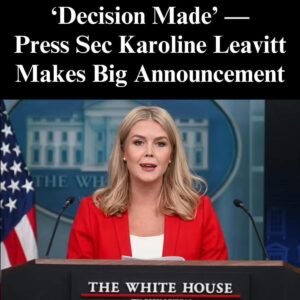Trump Administration Reshapes White House Press Access
In a major shift, the Trump administration announced Tuesday that the White House Correspondents’ Association (WHCA) will no longer decide which news outlets receive special access to the White House and briefing room. Instead, the White House press team will take charge of media credentials and briefing participation.
White House Press Secretary’s Statement
Karoline Leavitt, White House press secretary, confirmed the policy change, emphasizing that legacy media outlets will continue to have access. However, new and emerging media organizations will now also have the opportunity to participate.
“I am proud to announce that we are going to give the power back to the people who read your papers, who watch your television shows, and who listen to your radio stations,” Leavitt told reporters. “Moving forward, the White House press pool will be determined by the White House press team.”
A Shift from WHCA Control
This decision ends decades of WHCA influence over press access, a shift that Leavitt says better represents the modern media landscape. She argued that a small group of Washington-based journalists should not have exclusive privileges over others.
“A select group of D.C.-based journalists should no longer have a monopoly over the privilege of press access at the White House. All journalists, outlets, and voices deserve a seat at this highly coveted table,” she added.
Reaction from the WHCA
WHCA president Eugene Daniels, who also announced his new role as an MSNBC host, sharply criticized the decision. In a statement, Daniels warned that the policy change undermines press freedom in the U.S.
“The White House decision tears at the independence of a free press and suggests the government will choose the journalists who cover the president,” Daniels said. “In a free country, leaders must not be able to choose their own press corps.”
Legal Battles and AP’s Lawsuit
The announcement comes amid legal disputes between the White House and The Associated Press (AP). Recently, the AP sued the Trump administration for restricting its access to the briefing room, Air Force One, and other key locations. On Monday, a federal judge ruled in favor of the White House.
The Gulf of Mexico Controversy
Adding to tensions, last week the White House denied the AP access to the Oval Office and Air Force One after the organization refused to adopt the administration’s preferred term, “Gulf of America,” instead of “Gulf of Mexico.”
White House Deputy Chief of Staff Taylor Budowich defended the decision, calling AP’s stance “divisive” and “misinformation.”
“The Associated Press continues to ignore the lawful geographic name change of the Gulf of America,” Budowich wrote on X. “While their right to irresponsible and dishonest reporting is protected by the First Amendment, it does not ensure their privilege of unfettered access to limited spaces.”
Opening the Doors to More Journalists
Despite the controversy, the White House insists that the new policy will create broader access for journalists. A representative from digital news site Semafor was present at Tuesday’s briefing, reflecting the administration’s effort to diversify the press pool.
“Going forward, that space will now be opened up to the many thousands of reporters who have been barred from covering these intimate areas of the administration,” Budowich stated. “AP journalists and photographers will retain their White House credentials.”
AP Responds to Press Restrictions
Julie Pace, senior vice president and executive editor of the Associated Press, formally objected to the White House’s actions, calling them retaliatory.
“The actions taken by this White House were plainly intended to punish the AP for the content of its speech,” Pace wrote in a letter to White House Chief of Staff Susie Wiles. “It is among the most basic tenets of the First Amendment that the government cannot retaliate against the public or the press for what they say.”
The Future of Press Freedom
The Trump administration’s changes to press access policies are already sparking debate over government influence on media coverage. While the White House argues it is broadening access, critics claim it could set a precedent for limiting press freedom. As legal battles continue, the implications of this policy shift will likely shape future interactions between the media and the White House.
